SCBC teams claim prizes in Guangdong College Teaching Innovation Competition
SCBC teams and teachers won awards in the final of the 3rd National College Teaching Innovation Competition (Guangdong) held at Sun Yat-sen University from April 8 to 9. Specifically, Zhao Yun from the School of Education received a second prize with her session of “English Teaching Approaches” in the lecturer group, and a team of teachers (Wang Ruiying, Li Xiaomei, Zhang Qingda, Xia Zhao) from the Faculty of College English received a third prize with their session of Intercultural Communication” in the associate professor group. Thanks to their outstanding performance, SCBC was given an Excellent Organization Award.
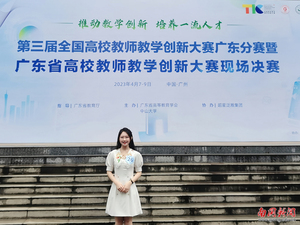
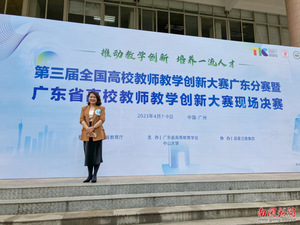
Directed by the Department of Education of Guangdong province and sponsored by Guangdong Institute of Higher Education and Sun Yat-sen University, the competition was launched in November last year. The competing teachers fell into three groups: lecturer group, associate professor group, and professor group. A total of 2,515 teachers (teams) from 63 undergraduate colleges and universities in the province participated in the competition. Based on the results of online evaluation and consideration by the organizing committee, 121 teachers (teams) were shortlisted to the final to compete for 21 first prizes (Grand Prize), 47 second prizes, 53 third prizes and 29 excellent organization awards.
The College Teaching Innovation Competition is the only college teaching competition for all disciplines, majors and titles included in the so-called “Three Evaluations and One Competition” of the Ministry of Education. The goal is to drive the quality, reform, development, and innovation of teaching with the dynamics of competition as well as to showcase the advanced teaching concepts and the innovations of college teachers in the new era. The competition will play an important role in promoting the reform of colleges and universities, the development of academic disciplines, and the building of a platform for displaying and exchanging teaching innovation of college teachers.
Vice President of Harding University visits SCBC to discuss the “3.5+1 Master's Program”
On April 14, Collins David Wayne, vice president of Harding University, led a delegation to visit SCBC and was received by Vice President Lai Zhili. The two universities held talks about the “3.5+1 Master's Program”.
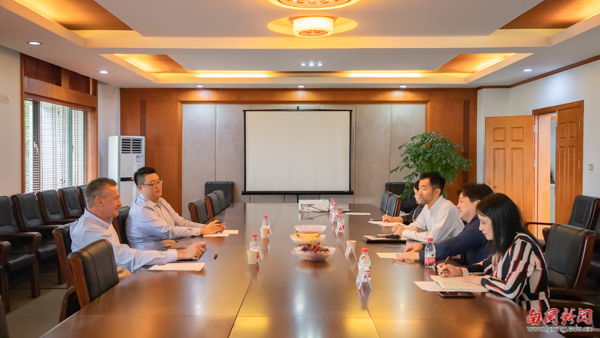
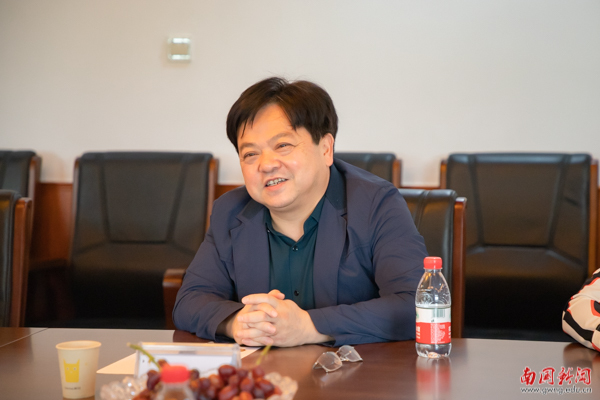
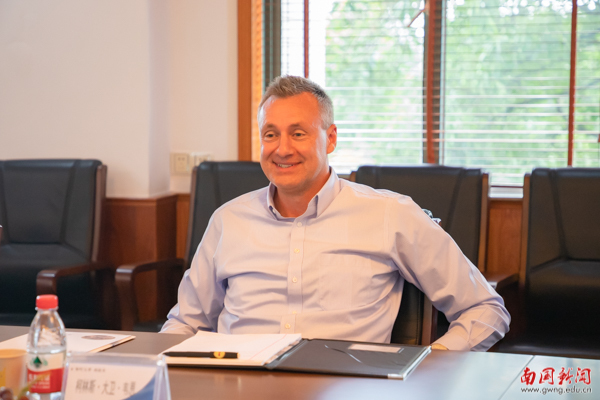
At the meeting, both sides introduced their respective institution, exchanged ideas and measures on how to strengthen cooperation in the context of internationalization of education, and had a preliminary discussion on the “3.5+1 Master's Program”. Collins David Wayne said that as both universities have a focus on business education and the cooperation dates back to a long time ago with such programs as “3+1+1 preschool education” and “2+2 dual bachelor's degrees”, there is surely more space that awaits to be explored in the development of collaborative undergraduate programs. Lai Zhili said that in recent years, SCBC has carried out exchanges and cooperation with many foreign universities and its great effort in this area has been rewarded, not only broadening the international vision of students, but also bringing new vitality into its future development.
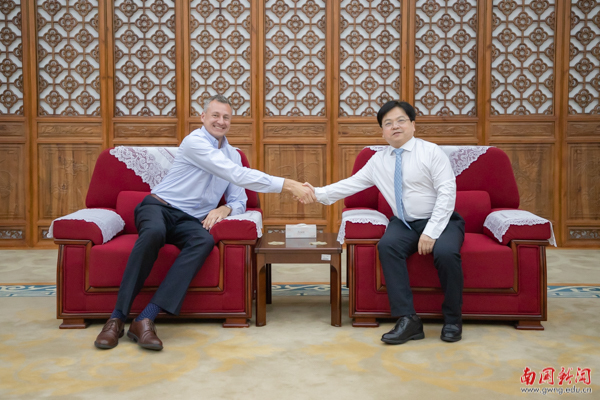
As the meeting came to a close, Wayne and Lai exchanged gifts and a group photo was then taken for the moment.
Wang Hua elected chairman of the Academic Committee of Research Base for Digital Development and Management Innovation for Service Industry in Guangdong
On April 21, the inaugural meeting of the Academic Committee of Research Base for Digital Development and Management Innovation for Service Industry(hereinafter referred to as “the Base”) was held at the International Conference Hall. Professor Wang Hua, executive president of SCBC and director of the Base, was elected chairman of the Academic Committee, and the Academic Committee Charter was reviewed at the meeting.
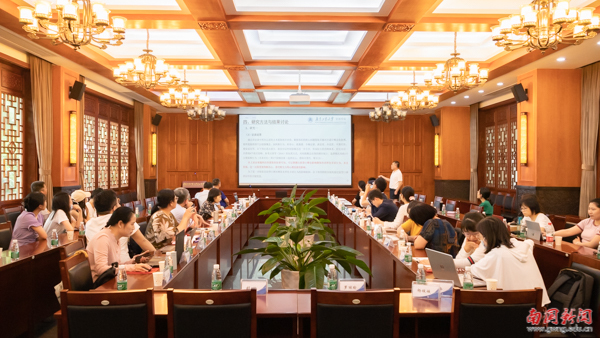
According to the related provincial regulations, the Base has hired nine experts as members of the Academic Committee, namely: Prof. Wang Hua, Prof. Xie Zhihua, former vice president of Beijing Technology and Business University, Prof. Ding Yougang, vice president of Guangdong University of Finance and Economics, Dr. Chen Hu, president of Shenzhen ZTE Cloud, Prof. Hong Qin from School of Hotel and Tourism Management of Hong Kong Polytechnic University, Prof. Peng Biyu, dean of School of Economics and Management of South China Normal University, Professor Zhang Depeng, dean of School of Management of Guangdong University of Technology, Prof. Luo Qiuju, vice dean of School of Tourism of Sun Yat-sen University, and Prof. Su Wujun of Guangdong University of Finance and Economics.
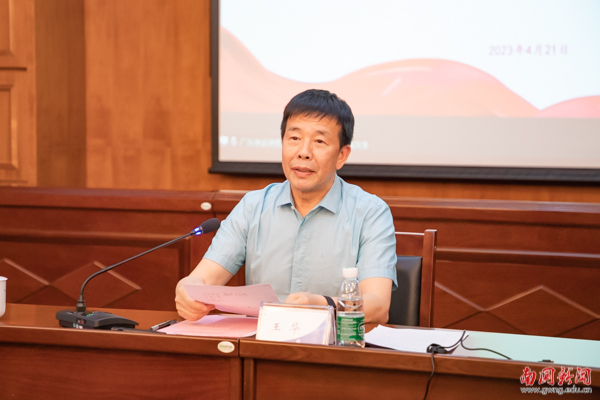
During the meeting, Wang Hua made clear the Base’s core objective of “focusing on digital development of service industry, innovating management mode of service industry, and promoting reform in training business majors”, and four research directions, which are: innovation in digital economy and accounting, digital marketing and customer behavior of service industry, digital human resource management of service industry, and digital transformation of exhibition industry.
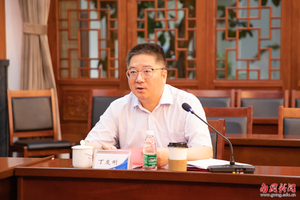
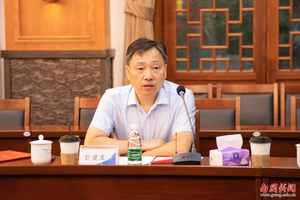
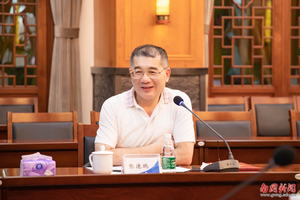
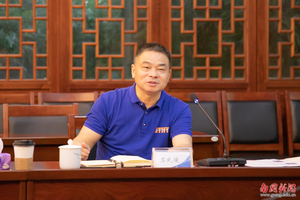
In affirmation of the research directions, the members all agreed that the Base is forward-looking, following closely the major trends of service industry development. At the same time, they also offered their opinions and suggestions from multiple perspectives, such as system development, team structure, and research specialization. They hoped that the Base could strive for high-quality achievements in the spirit of persistence and hard-work in the long future.
Wang Hua gave a closing remark. He thanked the experts for their valuable opinions and suggestions, saying that the Base will focus its effort on two aspects: first, the Base will rise with the occasion to explore new path of innovation and development for service industry in Guangdong, following the steps of Chinese modernization in an era of rapid development of information technology; second, the Base will keep an open mind to cultivate students and researchers and produce high quality results through cooperation with enterprises, industries, government departments, and other universities.